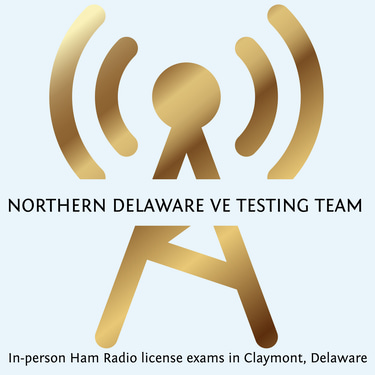TESTING/MENTORING SERVICES
Volunteer examiner FCC Part 97 in-person testing in Claymont. Delaware as well as ongoing support if you ask for it. In ham speak, to mentor someone is to act as their Elmer. We LOVE elmering new hams or those who just memorized the questions and answers to pass the exams(s) and have no idea what to do after the license posts to the FCC websites.
They don't mail paper licenses anymore, everything is either online and communication is via Email.
Achieve your Amateur Radio operator License goals quickly and as painlessly as possible. We can also either point you to licensing services for license modifications but we will always give you options to do it yourself for free when possible, or at least minimal charge wherever possible. We are here to support YOU, not the companies that offer" for a fee services".
Our Volunteer Examiners stand ready to guide you through the process of getting started and we provide ongoing elmer services as long as you want it.
We are volunteers so all you pay is the exam fee to us at the exam session and the application fee, paid directly to FCC online, no charge to register for the exams(s) or for mentoring services.
LICENSING SUPPORT
EXPERT HAM RADIO CONSULTATIONS
Amateur Radio is more commonly known as Ham Radio. The story behind the naming goes WAY back nearly to the turn of the 20th century but the condensed version is, radio communication was first most widely used by ship-board operators to communicate among themselves and shore stations using what the public calls Morse Code. TECHNICALLY this is incorrect: Morse code was developed for the land-based Telegraph system most widely used by the railroads and some commercial message delivery services. You can't send Morse Code over radio because there are no "dashes", just "dots" sequenced differently for each letter. The correct term for what is sent over radio is "International Code" that was developed for radio. The shipboard operators tended to be a clickish bunch that looked down on anyone who tried to learn anything new or advance what we now call technology. They dubbed anyone who learned code to get on Amateur Radio as "Hams" and the name became the public perception of Amateur Radio that has lasted to this day. The "professional radio operators" also swore you would never get radio to go above 1Mhz! With the attitude of the snobs, not trying to advance the state of the art or their craft, the world would be VERY different now since it was the hams who figured out how to make a radio that can convey voice, first with Amplitude Modulation (AM), Frequency Modulation (FM), and eventually the more energy efficient Double and then single sideband (SSB) and dozens of digital modes like Radiotelegraph (RTTY), AMTOR (and the commercial version SITOR), Packet Radio for data transmission, and many other data and/or text modes for transmission as well as two very different modes of television. Some will dispute it but without the innovation of hams and others who chose not to go the radio way, household appliances such as the Television and microwave oven would not exist today! Our contact VE (CVE), Robbie (AD3L) is old enough to have personally known some of the early pioneers of radio including the founder of WDEL, Willard Wilson, W3DQ. After he had WDEL up and running starting in 1922, Willard stood up an FM station and a TV station also under the callsign WDEL. FCC decided you can't have multiple stations under the same callsign so WDEL-FM became WSTW-FM and WDEL-TV was bought out, moved to Roxboro, west of Philadelphia as WHYY-TV. That regulation was relaxed more recently so now WDEL is on both AM and FM. Willard also experimented with UHF Television (remember the snobs said you can't go over 1 MHz?) and put a station up the street on the tower now owned by our CVE. For a little more radio history, check out his website at www.towerspace.net.
Before you get disheartened, you no longer need to pass a code test to take your written test for ham radio. In fact, FCC will no longer even give you a code test that I know of.
NORTHERN DELAWARE VE TESTING TEAM
Contact
© 2025-2026. All rights reserved.
(302) 212-4275
If no answer, PLEASE leave a message and someone will get back to you ASAP
Email (preferred contact method)
Register for an upcoming 2026 exam session
July 4, 2026 (Yes on the holiday)
Northern Delaware VE Testing Team, NDVETT
Ham Radio License Examinations
Current Question Pools:
Element 2 2022-2026 expires 6/30/2026
Element 3 2023-2027 expires 6/30/2027
Element 4 2024-2028 expires 6/30/2028
